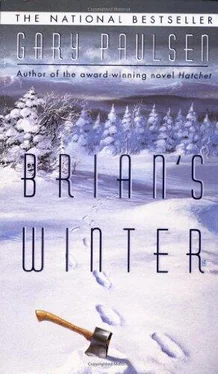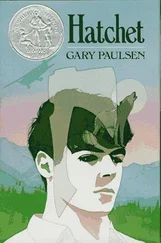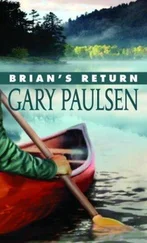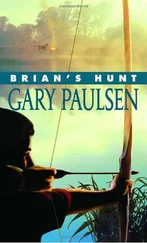Gary Paulsen - Brian's Winter
Здесь есть возможность читать онлайн «Gary Paulsen - Brian's Winter» весь текст электронной книги совершенно бесплатно (целиком полную версию без сокращений). В некоторых случаях можно слушать аудио, скачать через торрент в формате fb2 и присутствует краткое содержание. Год выпуска: 1998, ISBN: 1998, Жанр: Детские приключения, на английском языке. Описание произведения, (предисловие) а так же отзывы посетителей доступны на портале библиотеки ЛибКат.
- Название:Brian's Winter
- Автор:
- Жанр:
- Год:1998
- ISBN:9780440227199
- Рейтинг книги:4 / 5. Голосов: 1
-
Избранное:Добавить в избранное
- Отзывы:
-
Ваша оценка:
- 80
- 1
- 2
- 3
- 4
- 5
Brian's Winter: краткое содержание, описание и аннотация
Предлагаем к чтению аннотацию, описание, краткое содержание или предисловие (зависит от того, что написал сам автор книги «Brian's Winter»). Если вы не нашли необходимую информацию о книге — напишите в комментариях, мы постараемся отыскать её.
, 13-year-old Brian Robeson learned to survive alone in the Canadian wilderness, armed only with his hatchet. Finally, as millions of readers know, he was rescued at the end of the summer. But what if Brian
been rescued? What if he had been left to face his deadliest enemy-winter?
Gary Paulsen raises the stakes for survival in this riveting and inspiring story as one boy confronts the ultimate test and the ultimate adventure.
Brian's Winter — читать онлайн бесплатно полную книгу (весь текст) целиком
Ниже представлен текст книги, разбитый по страницам. Система сохранения места последней прочитанной страницы, позволяет с удобством читать онлайн бесплатно книгу «Brian's Winter», без необходимости каждый раз заново искать на чём Вы остановились. Поставьте закладку, и сможете в любой момент перейти на страницу, на которой закончили чтение.
Интервал:
Закладка:
They weren’t just stones in the shape of arrowheads. They had been worked, chiseled someway from larger stones to get the shape and edge. But what kind of stone and how? Wasn’t it some special type of rock, something that would flake off in sharp edges?
He had his hatchet on his belt and went back to the shore and started hitting rocks with the flat side of the hatchet. They just shattered and didn’t make any kind of sharp point. One rock chipped off a flake about three inches long and in the right shape but when he picked up the flake and tapped it with the back of the hatchet it fell into a dozen unusable pieces.
Flint. There, the word came to him. They weren’t just arrowheads, they were flint arrowheads — maybe they had to be flint to chip right.
So all he had to do was find some flint.
He went back to the lakeshore and looked at the rock supply again, smashing rocks with the back of the hatchet to see if any of them were made of flint. In truth, he didn’t really know what to look for, except that he remembered that flint and steel would spark when they hit.
He had smashed four or five more rocks looking for sparks when it came to him. There was a rock embedded in the wall of his shelter. He had thrown his hatchet at the porcupine the night he got stuck in the leg and the hatchet had showered sparks and led him to make fire.
It was there, in the fire rock. He had forgotten the rock because there had been matches and lighters in the survival pack he’d retrieved from the plane, and he hadn’t had to use the rock again.
He went and looked at it for the first time in more than a month, studied it. It was a dark rock; it had depth and seemed to have fracture lines or flaws in it. He struck it with the hatchet and smiled when he saw sparks, remembering the night the porcupine had come. But the rock didn’t shatter or flake. He looked at it from a different angle and saw a small ridge, little more than a line, and this time he aimed carefully and struck the line with the blunt corner of the hatchet, using a sharp tap with a little more muscle.
This time it cracked and a flake as wide as two fingers and three inches long fell to the ground beneath the rock.
He picked it up.
“Ouch!” He dropped it. The edge was as sharp as a razor and it cut his finger slightly. He sucked the blood away and picked the flake up more carefully, and turned it to the light. It had a slightly oval shape, pointed on one end and rounded on the other. Both sides leading down to the point were so sharp they would shave hair off the back of his arm.
All it needed to make it a true arrowhead was a pair of notches, one on either side of the rounded end. He put the flake on a flat rock and held it in place with his foot, vising it down tightly, while he chipped away at the notch positions with the tip of his hunting knife. He started with too big a piece and it broke the whole tip of the oval off and left the flake with a flat rear end. From then on he took tiny chips, each no bigger than the head of a pin, until he had an arrowhead that resembled those in the collection. It was not finished as well as the ancients had finished theirs, but it was sharp and tapered the right way and had a notch for tying it onto the shaft.
He took one of the shafts for the war bow arrows and split the grain on the end with the knife. He worked the point back into the split so that the notch was slightly recessed into the wood.
He had nothing with which to tie it into position and was casting around for a piece of string — nonexistent except for the original bowstring from his first bow or he would have used it long ago — when he saw the tree with the rabbit skins.
Whenever he took a rabbit he skinned it carefully and stretched the skin on the sides of an oak, holding it with wooden pegs driven into the bark until it was dry. He had not found a use for the skins yet but he hated to waste anything and thought something might come along. When they dried they were like thick paper with hair on one side, dry and crinkly and easy to tear. But the last hide he’d put up during the rain had not dried yet and he took it off the tree. Still damp, the hide had a strength to it and might make a kind of cord. He used the knife to cut strips from the rabbit skin and used one of the rawhide strips to tightly wrap and tie the point onto the split shaft.
When he was finished it seemed to be tight enough, and he had heard that rawhide shrinks when it dries, so that might make it even better. Of course the hair was still on the skin and stuck out all around and made the arrow look like a pom-pom, but a quick pass over the flames in the fire pit burned all the hair off, and when he was done he trimmed the ends of the lacing and it looked good.
“Almost professional.” He set the shaft aside and went back to the fire rock — he was already thinking of it as the arrow stone — and scrutinized it once more. Where he had broken the flake off it left two more edges, lines that looked the same as the first one, and he used the back of the hatchet to strike them the way he’d hit the first one.
Two more flakes came off, almost identical to the first one, and left two more lines. When he tapped those it happened again, and again until he had nine flake-points. He took them back to his work rock and clamped them with his foot and worked tie-notches into the shanks with the point of his knife and fitted them to the shafts with green rabbit hide and all of this, rock to points, in one day.
Just as bad things could snowball, Brian found that good things could come fast as well. While he was working with the rabbit skin in the cool evening he turned it to get a better angle and the hair brushed his hand and felt warm and he realized he’d found a way to stay warm.
He had fifteen dried skins and he brought them into the shelter at dark. He had not eaten again but the hunger was not as bad now because he was excited. Working in the firelight, he trimmed the hides to make them clean-edged and rectangular. He used one hide for lacing, cutting thin strips off the edge with his knife — the first-aid scissors were too small to help — and started lacing the others together to form a large rectangle. It took some time because he had no needle and used the point of the knife to punch a small hole through the sides of the hides and then a sharpened twig to push the lacing through. Also the laces weren’t long and he could only “sew” seven or eight inches before he had to tie it off and use a new lace and by the time he had four hides sewn together he could feel exhaustion taking him down. He crawled into his bag and slept hard and didn’t awaken until well after dawn.
Hunger awakened with him and he knew he had to hunt before he worked more on the hides so he took the light bow and arrows and went to the foolbird area. This time luck wasn’t with him and he missed three birds before he got a shot at a rabbit that hit. He cleaned it and used the green hide for lacing and started sewing again while his stew cooked and before he knew it he was back in the shelter again, working in the light from the fire, his stomach full and his fingers flying. But this time before he fell asleep he had finished sewing the rabbit skins into a rectangle roughly two feet wide by nearly six feet long.
“It would make a good rug,” he said, crawling into the bag to sleep at what he thought must be three or four in the morning.
Just before sleep came he heard the wolves. It sounded like two of them, high, keening howls as they sang to each other and then a crash in the brush as they chased something — maybe a deer. He had not heard from them in almost two weeks. There had been a time when the howls would have frightened him, given him an eerie feeling, but now he smiled. They must have gotten caught in the weather if it had taken them so long to run a circuit of their range, and he supposed they would mark the edge of their territory on the way through. He would have to go up and re-mark his own — the rains would have taken the smell away — the first thing in the morning.
Читать дальшеИнтервал:
Закладка:
Похожие книги на «Brian's Winter»
Представляем Вашему вниманию похожие книги на «Brian's Winter» списком для выбора. Мы отобрали схожую по названию и смыслу литературу в надежде предоставить читателям больше вариантов отыскать новые, интересные, ещё непрочитанные произведения.
Обсуждение, отзывы о книге «Brian's Winter» и просто собственные мнения читателей. Оставьте ваши комментарии, напишите, что Вы думаете о произведении, его смысле или главных героях. Укажите что конкретно понравилось, а что нет, и почему Вы так считаете.











